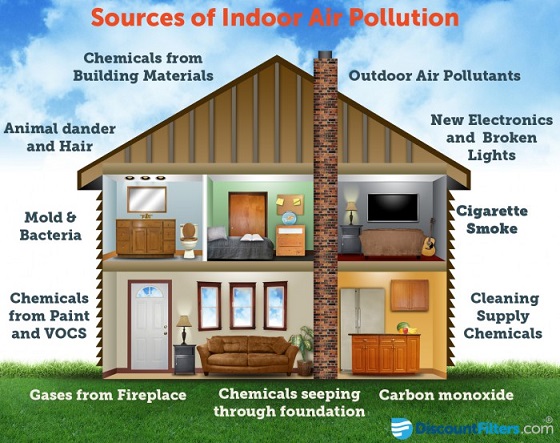
Today, approximately 90% of the time is spent indoors. Indoor air unlike outdoor air doesn’t get recycled continuously causing it to trap and build up pollutants. This thus leads to building of a harmful indoor environment for humans. This article explains the Causes of Indoor Air Pollution and Their Effects on Human health.
We want our indoor environment to be fresh and pollution free.
Don’t we?
So, for this we should first know what indoor air quality (IAQ) is.
Indoor air quality can be defined as quality of air indoors (buildings) as represented by concentration of pollutants and thermal conditions that affect the health, comfort and performance of occupants.
Poor indoor air quality has short term and long term effects on human health.
The sources and pollutants of indoor air pollution resulting in effects of above mentioned effects on human health are:-
| Causes of Indoor air Pollution | Pollutants |
| Fireplace, woodstove, Tobacco smoke, automobile exhaust (attached garage) | CO, CO2, NOx, SO2, PAHs, PM
|
| Tobacco products | Environmental tobacco smoke, PM |
| Paints, Aerosol sprays, varnishes, wood preservatives, | Volatile organic compounds (VOCs) |
| Interior plywood, nail polish, glue and adhesives | Formaldehyde |
| Pesticides, Herbicides, Insecticides
| |
| Building material, Soil or well water | Radon |
| Biological contaminants
| Bacteria, Mold, Fungi |
| Fire proofing, deteriorating or damaged insulation | Asbestos |
Learn More about Commercial Air Quality Testing.
To obtain a healthy pollution free indoor environment i.e to obtain good indoor air quality, we must monitor IAQ.
IAQ monitoring involves analysis and survey methodology to understand and grade indoor air quality
It makes consideration of following points during monitoring procedure:-
read More about Indoor Air Quality Monitoring Parameters
Monitoring procedure for IAQ takes into consideration of following points before starting analysis
Indoor air quality testing company – Perfect Pollucon Services
Some instruments and software used to carry out analysis of Indoor air quality
| Instrument/Software | Parameter |
| Thermo-Hygrometer | Temperature, Humidity |
| DustTrak | CO, PM1, PM2.5, PM10, SOx, NO2 |
| Ecotect, Autodesk flow simulation, Fusion | Simulation of air velocity, air flow, wind |
Once monitoring of IAQ is performed, we can compare the results with standards provided by National Building Code (2016). National Building Code (2016) standards have been designed for Indian buildings.
On comparison with Indoor air Quality standards we can easily get an idea about the quality of our indoor air.
Read more Which plants keep indoor air clean and Fresh?
Indoor air of good quality is important to have a healthy life. Knowing about your indoor air quality and maintaining quality of indoor air will definitely help us in the long run.